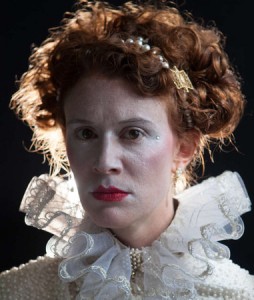
Philadelphia Artists’ Collective’s tightly-corseted production of Friedrich Schiller’s Mary Stuart, starring the earth-shattering Charlotte Northeast and the finely-tuned Krista Apple Hodge will leave you white-knuckle-gripping the edge of your seat. Sitting in a severe theater-in-the-round circle, the audience itself forms four oppressive walls seemingly trapping the actors on the Broad Street Ministry’s cherry wood floor. If Schiller were alive today, he would raise a thumb in approval of director Dan Hodge’s minimalist approach. Space is necessary to make room for the colossal ideas hurled about in this play. A philosopher at heart, Schiller systematically exposes the anatomy of true power. On the surface, Mary revolves around two 16th-century women, born and bred to rule over the male-dominated England: Protestant Elizabeth I and her Catholic cousin Mary Stuart of Scotland.
Schiller was a German playwright-philosopher, who read Rousseau as a young man and kicked it with Goethe. At school, he wrote his first play, The Robbers, feverishly championing the ideals of the French Revolution and exposing the social corruption of the French Court. Young Fredrich became an instant success and an honorary member of the French Republic. He witnessed the drastic socio-political upheaval and the hysterical brutality of the French Revolution. By 1794, tens of thousands were executed by the guillotine, the French National Razor. The Revolution ended in 1799 and the very first production of Mary premièred in Weimar, Germany in 1800, only seven years after the beheading of Marie Antoinette. Schiller devotes our attention to the tragic last days of Mary Stuart.
Schiller mines the drama in history by presenting contradictions. At the top of act one, Elizabeth I, Queen of England residing in the ornately decorated Palace of Westminster, says: “Monarchs are but the slaves of their condition; they dare not hear the dictates of their hearts.”
Mary Stuart, former Queen of Scotland, has been Elizabeth’s captive, inhaling the air of an English prison for 18 long years. Yet his imprisoned Mary says:
“The laws of England are no rule for me.
I am not England’s subject; I have ne’er
Consented to its laws, and will not bow
Before their cruel and despotic sway.”
Hodge’s vacant space provides the audience with a blank canvas to paint for themselves the naked walls of Mary’s prison and Elizabeth’s palace. Of course, both Hodge and Schiller hope we confuse the palace for a prison. Perhaps in very same fashion Marie Antoinette’s Tuileries Palace became a prison on October 5th, 1789 when a mob of Parisian women stormed Versailles and the French royal family was forced to move there under the watch of the National Guard.
It was difficult to breathe watching the delicate Krista Apple-Hodge as Elizabeth taking tiny sips of air, confined in a multi-layered wooden-laced whale-boned corseted gown, as she said:
“Woman’s not weak; there are heroic souls
Among the sex; and, in my presence, sir,
I do forbid to speak of woman’s weakness.”
The noble Charlotte Northeast’s portrayal of Mary made me inwardly shake so much I couldn’t scribble notes on my tiny spiral pad in the darkened theater as critics typically do. During the necessary intermission, I confessed to Hodge: “I am totally shaking.” He said: “I hope that’s a good thing.” It totally is, Mr, Hodge, it totally is.
The cast of twelve (Ross Beschler, Brain McCann, Nathan Foley, Adam Altman, John Lopes, Joshua Kachnyz, Brandan Moser, Rueben Wade, Kate McLenigan Altman, and Francesca Piccioni) are first-rate actors by necessity. A less talented company would drown in the fabric of Katherine Fritz’s frocks, or stutter-stumble-choke on the complex language of Schiller’s lengthy text. And, since fashion was literally dictated by the law books in Elizabeth’s England, I would venture to suggest that Katherine Fritz’s costumes, mantels of finely decorated drapery, be added to list of characters to make a cast of 13.
